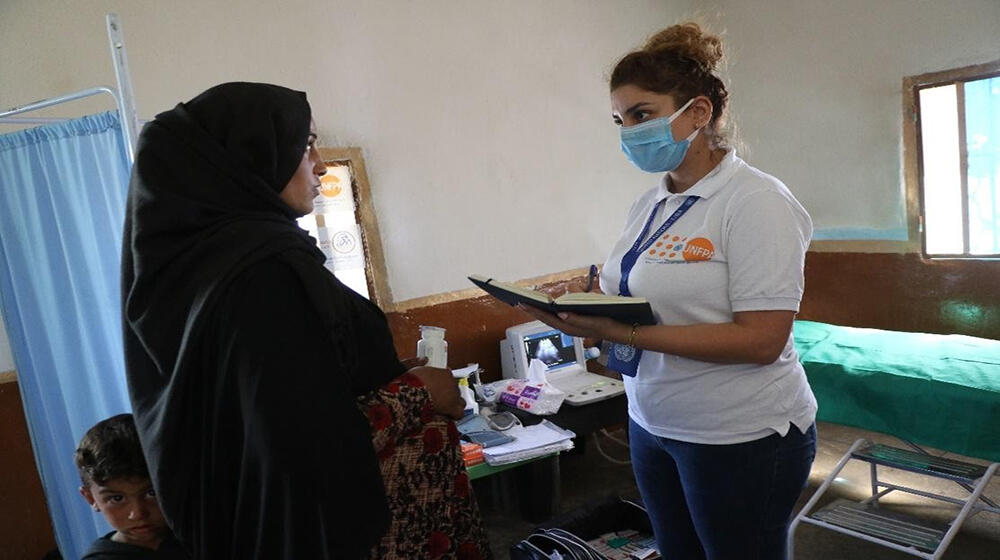“When we returned, life was difficult due to the massive destruction in the area and the absence of basic health services,” recalls Rasha, one of the pregnant women from DeirHafir, Aleppo, who are unable to access basic reproductive health services. “Because of the crisis, most of the doctors and healthcare workers have left.
“With the help of a UNFPA-supported integrated mobile team, which provides reproductive health and gender-based violence response services, Rasha was able to seek medical attention during her pregnancy. A gynecologist, a midwife, a gender-based violence case worker, a psychosocial support officer, and three outreach volunteers are working simultaneously in remote areas to ensure that no one is left behind.
Rasha decided to return to her village in Rasmal-Hamis after the area became accessible to humanitarian actors back in 2018. Just like many other families who had returned to Deir Hafir and its countryside, Rasha was immediately confronted with widespread destruction and limited access to basic services, particularly to health services. During the crisis, 50 percent of Syrian hospitals were completely or partially destroyed and over 40percent of healthcare personnel have since left the country. Poor and very expensive transportation systems in remote areas make it even harder for women to seek support in the nearest cities.

Almost 65 km away from Aleppo, and from the nearest hospital, Rasha was nine months pregnant when she first benefited from UNFPA-supported services in Deir Hafir. Prior to her visit, she had never received medical attention throughout her pregnancy.
As thousands of internally displaced people returned to rural Aleppo in 2018, UNFPA first deployed a mobile team to provide essential reproductive health services to remote villages. Due to increasing needs in the area, a primary health clinic and a women and girls’ safe space were established in 2019, allowing for the redeployment of the mobile teams to more villages in the vicinity of Deir Hafir.
Since 2021, UNFPA has been working on adapting its integration strategy to reach the furthest behind with life-saving joint reproductive health and gender-based violence services in one location, including antenatal and postnatal care services, treatment of respiratory tract infections and urine tract infections, early detection of breast and cervical cancer, menopause and post-menopause care, individual and group information dissemination sessions for all, neonatal care, family planning, GBV case management, psychosocial support and individual material support (mainly sanitary napkins and dignity kits). The current integrated mobile team active in Deir Hafir rural area covers 12 villages on a monthly basis. These villages have no access to medical and protection services, and UNFPA is often the only actor available in the area.

Fatima participated in an awareness session on family planning run by the mobile team in Rasm Al Hamis village in rural Aleppo
On a daily basis, the integrated mobile team provides a full package of services to about50 women and girls while linking women from rural areas to UNFPA-supported static facilities in Deir Hafir, showing the integral role of the integrated mobile team. Feedback and data gathered from partners and field staff show that the integration of the mobile teams has enabled UNFPA to reach twice the number of beneficiaries compared to a single service mobile team.
The integrated mobile team has also become a safe space for women to share their concerns with professional staff as they receive medical assistance and attend awareness sessions.
“When I don’t have a medical consultation, I come to attend the awareness sessions as we want to be educated rather than left behind, “explained Rana, a 33-year-old mother of six. Rana mentioned the importance of raising awareness on family planning and the values of information she receives throughout the sessions.
Engaging the local community, making the best of the available resources, and most importantly reaching those in need in Syria are among the benefits of UNFPA’s new integration strategy. Integrated mobile teams have proven to be an efficient, cost-effective service, enabling UNFPA to reach twice the number of beneficiaries compared to a single service mobile team. Thanks to our donors, people in remote areas have been able to benefit from life-saving services.


